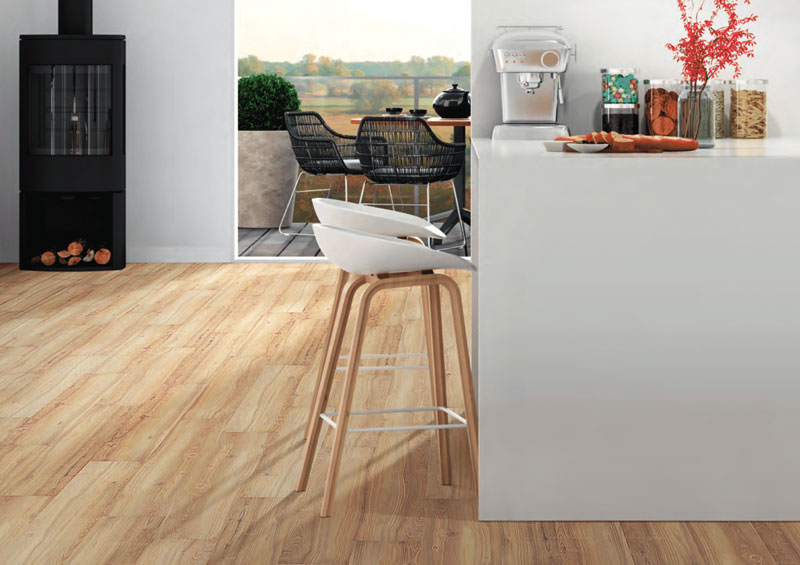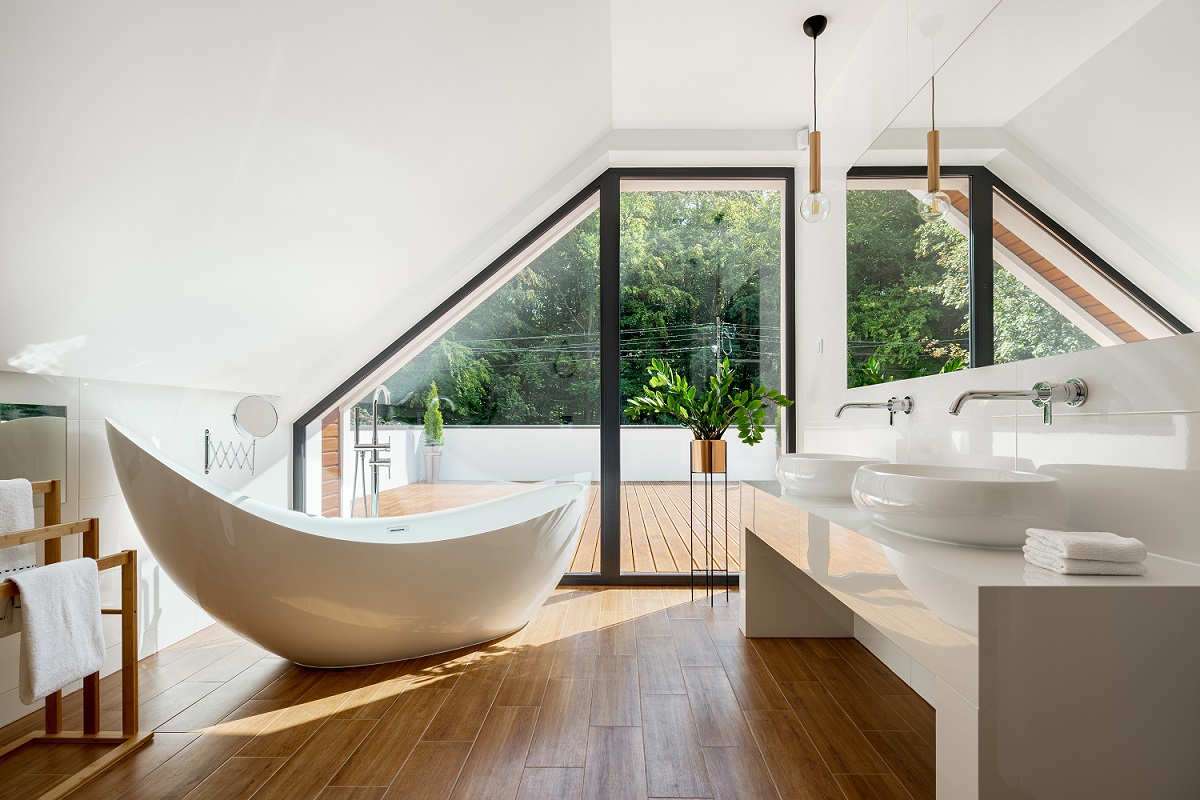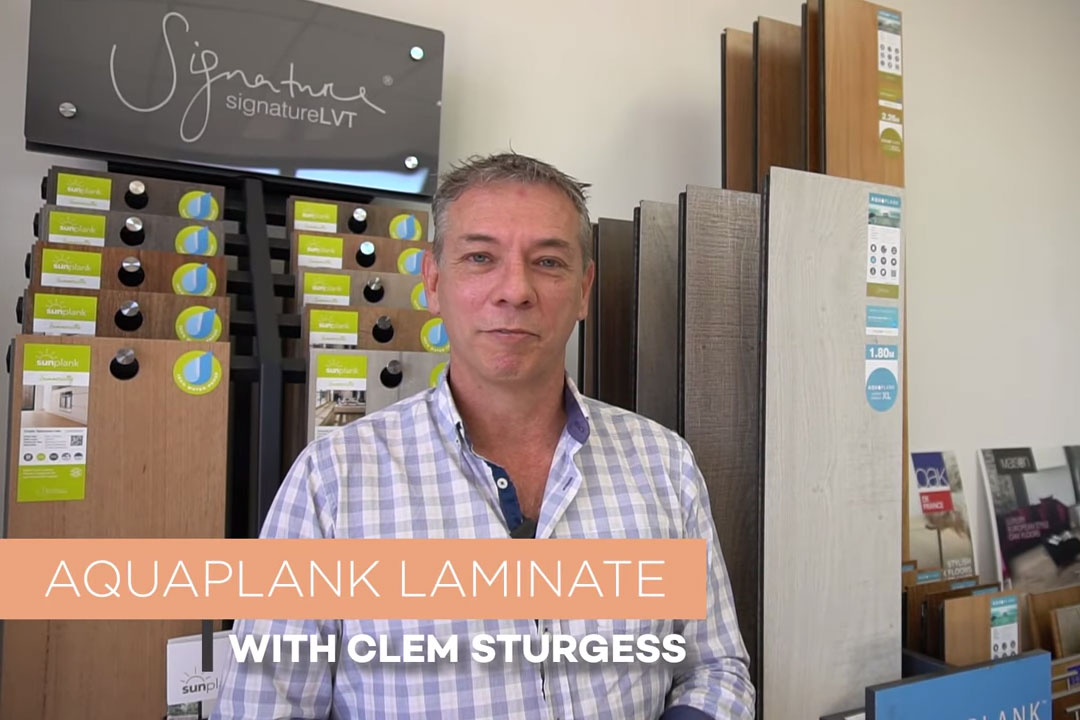When exposed to excessive moisture, certain flooring materials are susceptible to a variety of negative effects, making them a poor choice for areas of the home prone to wet or damp conditions.
In this blog post, you’ll learn what the best (and worst) flooring options for wet surfaces are.
Why You Don’t Want Water Damaged Floors?
Water-damaged floors may lead to:
- Colour distortion
- Household odours
- Furniture damage
- Mould and mildew growth
- Wallpaper damage
- Paint damage
- Swelling, cracking, or warping
- High repair or replacement costs
- Health hazards from contamination
So what is the best flooring for kitchens, laundries, basements, entryways, and bathrooms? Read on as we discuss the best and worst options.
Organic vs. Inorganic Flooring Materials
One way to tell if a flooring material is suitable for wet areas is whether it is made of inorganic materials (synthetic plastics) or organic materials (a carbon-based material that was once living), such as timber. Generally, floor coverings comprised of synthetic materials will fair better in damp conditions than flooring containing organic materials.
When exposed to dampness, organic materials quickly begin decomposing. Alternatively, inorganic materials are mostly protected against the effects of moisture.
Of course, not every flooring material is completely inorganic or organic. Plastic laminate flooring, for example, has a 100 percent inorganic surface, but its base layer is usually comprised of wood fibres. This puts laminate flooring lower on the list when it comes to the best flooring choices for damp locations.
On the other hand, bamboo is a completely organic material, but since bamboo flooring also contains a high ratio of synthetic glues and resins, it is fairly good at maintaining its integrity when exposed to moisture.
The Best Flooring for Wet Areas
- Loose Lay Vinyl Planks
- Hybrid Flooring
- Concrete
- Tile Flooring
The floor coverings we’ll go over here all boast excellent protection against dampness and moisture, and make great options for basements, laundries, bathrooms, and kitchens.
1.) Loose Lay Vinyl Planks
When it comes to the best flooring for wet areas, luxury vinyl flooring is hard to beat. With its inorganic composition of 100 percent plastic, UV cured top layer, and lock-and-fold style fit, vinyl planks form an almost impenitrable seal against water.
Every layer of vinyl flooring is waterproof — even the core — making it a beautiful, functional addition to kitchens, entryways, laundries, bathrooms, and basements. It is an ideal choice for homeowners who want a floor that mimics the look of timber without the fear of water damage. However, it is still important to clean up any spills immediately, as some water may seep through to the subfloor, particularly in cases of poor installation.

Loose lay vinyl planks are ideal for moisture prone parts of the house, such as the kitchen or dining areas.
2.) Hybrid Flooring
Hybrid flooring — a combination of the best aspects of laminate and vinyl planks — gives you the stunning look of hardwood flooring, without the fear of water damage. Hybrid flooring is 100% waterproof and designed for use in rooms likely to be exposed to moisture or spills.
3.) Concrete
When properly sealed, concrete provides an exceptional barrier against water. Although it is mostly seen in utility areas, concrete (particularly decorative concrete) is gaining popularity in other areas of the home.
4.) Tiles
Tile flooring, such as ceramic or porcelain, is a waterproof option for wet areas of the home, but care must be taken to ensure no moisture seeps underneath as this can promote mould growth.
Acceptable Flooring Covering for Damp Locations
While the following floor coverings are not completely waterproof, their surface layer is usually waterproof or water resistant and can withstand short periods of water exposure without harm.
1.) Engineered Timber
If you want timber floors throughout your home, including wet areas, you may want to consider engineered timber. With a sturdy, somewhat water-resistant plywood base, engineered timber can be a possible floor covering for rooms such as kitchens.
With a top layer of actual wood, engineered timber gives the exact look of solid timber, while offering a more water-resistant option. Engineered hardwood can hold up well in rooms with higher moisture and humidity. However, if the boards are not properly sealed and a leak occurs and water gets under the boards, damaged planks will be difficult to replace.
Although engineered wood cannot withstand prolonged exposure to standing water, occasional spills are not an issue. Most engineered timber manufacturers warranty their products against moisture damage, but spills still need to be wiped up immediately. To ensure the best protection against moisture, be sure the wood is coated with a urethane finish, and avoid planks with beveled edges, as these can cause water to collect in the grooves.
2.) Laminate Flooring
Although laminate flooring performs better than solid timber in moisture tests, its fibreboard core is prone to swelling and blistering if it comes in contact with water.
Is using laminate in a moisture prone room is important to you, the Signature Floors AquaPlank range of laminate may be worth considering. This range features unique features designed to keep it water resistant up to 72 hours.
3.) Bamboo Flooring
Bamboo is a beautiful, durable, and relatively water-resistant option that can serve as an alternative to laminate flooring in wet areas. However, it still is not a particularly great option for basements or full baths that are particularly prone to water damage and excessive moisture. It can make a great addition to entryways or kitchens due to its blend of water-resistant resisns and chemicals.
The Worst Flooring Choices For Wet Locations
We do not recommend the following flooring coverings for wet areas:
1.) Solid Hardwood Floors
Solid hardwood timber flooring is particularly susceptible to moisture penetration between boards. This can lead to a host of unwanted issues and makes solid timber an especially poor choice for spots such as the kitchen or bathroom.
2.) Carpet
Although it is a synthetic, inorganic material (aside from cotton or wool blends), carpet (including carpet tiles) is a poor choice for damp areas of the home. Once it gets wet, carpet takes a long time to dry out, allowing a chance for mildew and mould to grow.
Whether it is a fully synthetic, inorganic blend or an organic material such as wool or cotton, carpet is not a recommended floor covering for areas prone to moisture. If you must install carpeting in a basement, be sure to elevate it off the slab using a raised subfloor of plywood and sleepers and check with the manufacturer for any advice.
Tips For Protecting Your Floors Against Moisture Damage
While choosing a moisture-resistant flooring material to protect your home and floors against water damage, there are other important precautions to take, even if the flooring is 100% waterproof.
Along with preventing water damage, these tips will help keep your floors looking their best and increase their lifespan:
- Encourage visitors to take off their shoes when they enter your home (this prevents moisture damage, plus removing your shoes in the house offers a host of other benefits)
- Place mats inside and outside all entrances of your home
- Clean up any spills or leaks immediately
- Dry pets off completely before allowing them inside if they get wet or muddy (for more information about pet-friendly flooring see this post)
- Reseal any grout or other sealants if you notice cracking
Need Help Deciding?
Do you need help choosing the best flooring for a wet area in your home? Our team would love to help! Contact us today and we’d be happy to help you find the best flooring for your style, budget, space, and needs.





